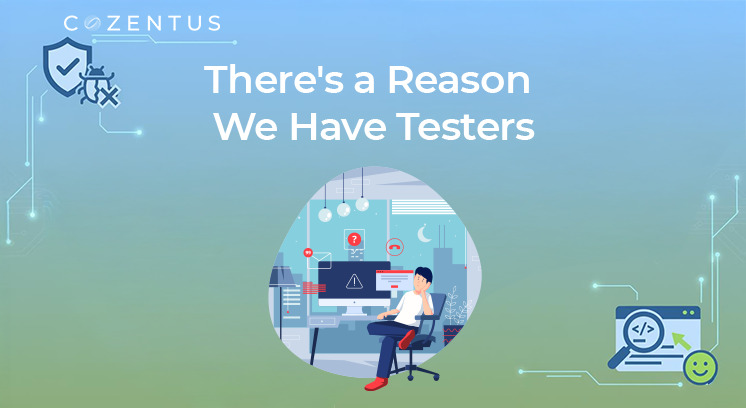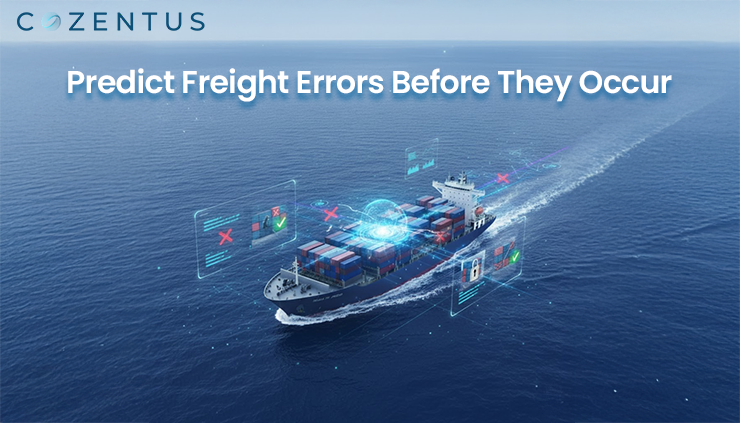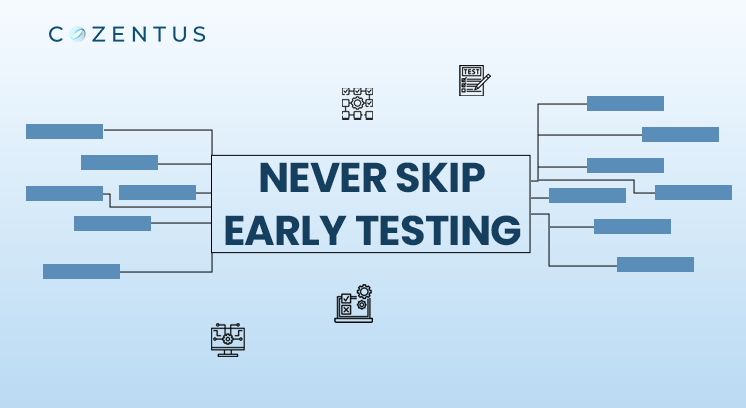The Mistakes Companies Make During Software Development
In every logistics project, there is pressure to move fast. Companies want to launch new features, automation, and dashboards quickly to stay competitive. But in this rush, testing often gets mixed with development, and quality checks take a back seat.
It may seem faster when the same developer who writes the code also tests it. In reality, this shortcut creates hidden risks, extra rework, and missed deadlines that slow down delivery instead of speeding it up. Small issues in testing can later turn into big business disruptions.
At Cozentus, we have learned that strong, reliable systems come from keeping development and testing separate. When each team focuses on what they do best, delivery becomes smoother, product quality improves, and business confidence grows.
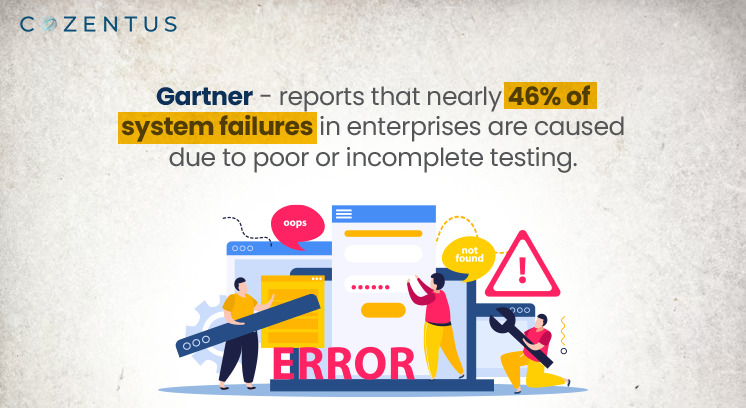
When Developers Test Their Code – It Mostly Fails
Developers are excellent builders. Their job is to make systems work. But when they test their own code, they naturally look for confirmation that everything runs as expected. This creates a lot of blind spots.
Testing requires a completely different mindset. It needs someone who is curious enough to ask “what could go wrong” instead of “does it work.” Logistics systems, for example, handle unpredictable situations such as:
- Delayed or incomplete carrier updates
- Port or customs disruptions
- System failures between TMS, WMS, or ERP
- Incorrect data mapping across integrations
Independent testers focus on these real-world scenarios before the system reaches production. They validate from the user and business perspective, not the developer’s point of view. That independence ensures the solution is ready for live logistics operations.
Independent Testing Provides Honest and Reliable Results
An independent testing team brings neutrality to the process. Their role is not to defend the code but to protect quality. This separation builds trust within the project and provides clear visibility to business stakeholders.
Cozentus follows a structured testing approach that covers every stage of delivery, including:
- Functional testing: To verify individual modules and workflows.
- Integration testing: To confirm data exchange between connected systems.
- Performance testing: To check response time and load capacity.
- Regression testing: To ensure new changes do not break existing features.
When testing is carried out by independent experts, the results are unbiased and reliable. You know what is working, what needs fixing, and what can scale safely. That clarity helps leaders make better go-live and investment decisions.
Separate Testing Helps Projects Move Faster
Many companies assume that having separate testers will slow down development. The reality is just the opposite.
Testing and development should be managed as parallel processes, not sequential ones. While developers build new features, testers validate completed modules simultaneously. This results in:
- Early defect detection
- Reduced last-minute rework
- Faster release cycles
- More predictable delivery timelines
In logistics, where multiple systems such as TMS, WMS, carrier portals, and finance platforms interact, early and independent testing prevents costly breakdowns at later stages.
Independent Testing Creates Business-Level Clarity
Testing is not only about checking if a feature works. It is about confirming that it supports business outcomes.
For example, in a logistics automation project:
- A developer may focus on whether a script runs correctly.
- A tester will focus on whether the automation reduces manual effort, eliminates exceptions, and aligns with business goals.
Companies should emphasize business-focused testing to ensure that each release offers measurable improvements, such as:
- Reduced operational time per shipment
- Improved data accuracy in billing or freight payment
- Better compliance with customer or regulatory requirements
- Fewer exceptions in daily operations
Testing results then become meaningful insights for business leaders, not just technical metrics.
Independent Testing Reduces Rework and Unexpected Costs
Every defect that slips through early testing becomes exponentially costlier later. Industry data shows that fixing a bug after production can cost up to 30 times more than fixing it during development.
In logistics, where system uptime directly impacts shipments and customer satisfaction, this cost is even greater. Issues like broken rate APIs, duplicate invoices, or failed carrier updates can quickly create major financial and operational losses.
Cozentus helps organizations avoid these risks through:
- Early defect detection and prevention
- Automated regression suites that reduce manual testing time
- Predictive analytics to identify potential problem areas before deployment
The result is fewer escalations, smoother go-lives, and lower maintenance costs.
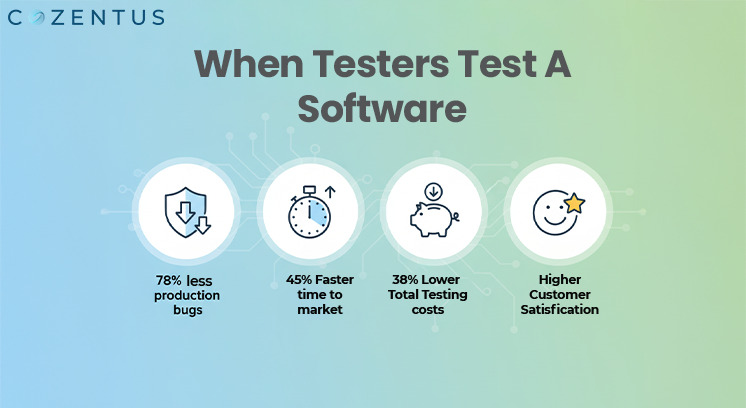
Automation and AI Strengthen the Testing Process
Modern testing is evolving rapidly. Automation and AI now play a major role in ensuring both speed and accuracy.
We integrate automation frameworks to simulate complex logistics scenarios such as:
- Multi-leg shipments with multiple carriers
- Live tracking data synchronization
- Automated exception management workflows
- Data validation across multiple connected systems
Our testers also apply AI-based analysis to predict defects based on historical trends and testing data. This proactive intelligence helps project teams focus on high-risk areas early.
The outcome is faster validation, consistent quality, and stronger testing independence.
Developers and Testers Working Together is the Best
Separating testing from development does not create silos. It creates balance. Developers and testers should work as collaborative partners:
- Developers focus on innovation, code quality, and feature delivery.
- Testers focus on validation, risk management, and business readiness.
This healthy collaboration ensures that both teams respect each other’s expertise. The end result is not just working software, it is a trusted and tested solution ready for real-world use.
A Clear Testing Strategy Strengthens Every Project
Having an independent testing team also means having a structured testing plan that supports long-term scalability.
Cozentus creates a customized testing strategy for every client, which typically includes:
- Understanding system and business requirements
- Identifying key risk areas and dependencies
- Designing a test plan and reusable automation assets
- Setting measurable KPIs for quality and delivery outcomes
This process builds predictability into complex logistics transformation programs. When testing is structured and objective, delivery becomes smoother and less dependent on assumptions.
Conclusion: Quality Should Be a Shared Priority
When developers test their own code, quality often downgrades. When testing is managed by an independent team or tester, quality becomes measurable, transparent, and dependable.
At Cozentus, we believe that software quality defines business reliability. Our independent testing services ensure that every logistics platform, automation workflow, or data integration performs exactly as expected.
In today’s fast-moving logistics landscape, even a small software glitch can delay shipments, disrupt billing, or damage customer trust. Independent testing prevents that. It ensures your systems not only work but work right, every single time.
Build trust in your systems, not just tests. Talk to our expert.
Recent Post
Subscribe to our newsletter
Stay updated on latest trends and news in the supply chain and logistics industry

